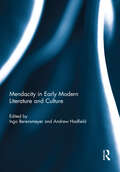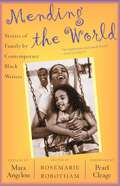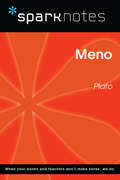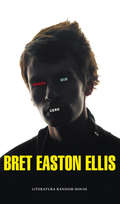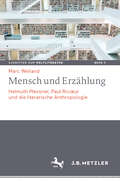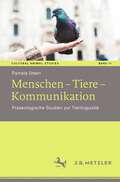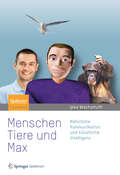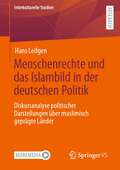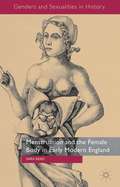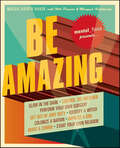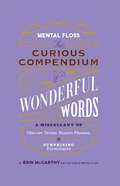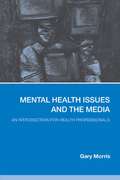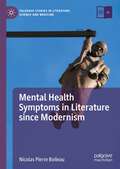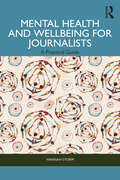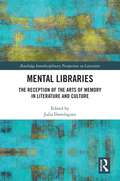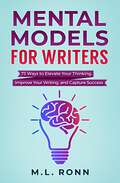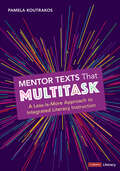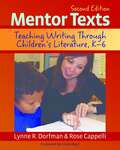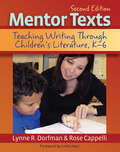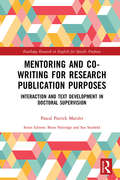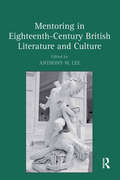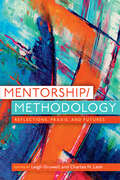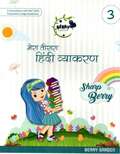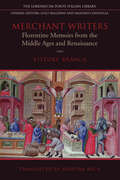- Table View
- List View
Mendacity in Early Modern Literature and Culture
by Ingo Berensmeyer and Andrew HadfieldMendacity in Early Modern Literature and Culture examines the historical, cultural, and epistemological underpinnings of lying and deception in early modern England, including the political, religious, aesthetic, and philosophical discourses that governed the codes of lying and truth-telling from the sixteenth to the early eighteenth centuries. The contributions to this collection draw on a wide range of early modern English literature from Shakespeare to Swift, and from travel writing to poetry, in order to explore the extent to which plays, poems, and narrative texts in this period were sites of negotiation, and, at times, of ideological warfare between the moral imperative of truth-telling and the expediency of telling lies. What were the cultural norms of truthfulness and lying, and on what basis were they constructed? What were the consequences when someone did not share the assumed common project of truth-telling? And which forms of communication were exempt from the pragmatic strictures on mendacious discourse? This book was originally published as a special issue of the European Journal of English Studies.
Mending the World: Stories of Family by Contemporary Black Writers
by Rosemarie RobothamThe many facets of black family life have not always been fully visible in American literature. Black families have often been portrayed as chaotic, fractured, and emotionally devastated, and historians and sociologists are just beginning to acknowledge the resilience and strength of African American families through centuries of hardship. In Mending the World, a host of beloved writers celebrate the richness of black family life, revealing how deep, complicated, and joyous modern kinship can be. From Jamaica Kincaid's portrait of a young girl moving away from her mother to better know herself to Alice Walker's reflection on the joy and pain of her relationship with her own daughter; from Edwidge Danticat's fictional evocation of a young woman rocked by revelations about her parents to James McBride's elegy for his stepfather, this inspiring volume presents-through fiction, memoir, and poetry-a multi-layered and optimistic portrait of today's black America.
Meno (SparkNotes Philosophy Guide)
by SparkNotesMeno (SparkNotes Philosophy Guide) Making the reading experience fun! SparkNotes Philosophy Guides are one-stop guides to the great works of philosophy–masterpieces that stand at the foundations of Western thought. Inside each Philosophy Guide you&’ll find insightful overviews of great philosophical works of the Western world.
Menos que cero
by Bret Easton EllisClay regresa a Los Ángeles durante las vacaciones de Navidad. En el aeropuerto lo espera su novia Blair, por la que siente una profunda indiferencia. Un escueto mensaje de su madre sobre la mesa de la cocina y la nueva criada lo aguardan en casa. Enseguida intenta ponerse en contacto con Julian, su huidizo mejor amigo, que ha abandonado la universidad y coquetea con la heroína, pero no consigue encontrarlo. Sin nada mejor que hacer, se reincorpora a sus viejas rutinas: un frenesí de fiestas interminables, sexo sin miramientos y montañas de coca.Retrato de una sociedad en la que cada adolescente tiene su dealer y en la que las emociones se miden en fajos de billetes, Menos que cero es la primera novela del autor de American Psycho. Escrita cuando Bret Easton Ellis contaba solo veinte años, Menos que cero narra, con un estilo gélido y contundente, las andanzas de un grupo de adolescentes a la deriva en los años ochenta, y sorprendió a la crítica para convertirse inmediatamente en obra de culto.
Mensch und Erzählung: Helmuth Plessner, Paul Ricœur und die literarische Anthropologie (Schriften zur Weltliteratur/Studies on World Literature #9)
by Marc WeilandDer Mensch lebt von Natur aus in und mit Geschichten. Mit Erzählungen bestimmt er, als wer oder was er sich denkt und wer oder was er ist. Den damit verbundenen anthropologischen und subjektivitätstheoretischen Grundlagen und Funktionen des Erzählens geht die Untersuchung anhand einer systematischen Verschränkung der Philosophischen Anthropologie Helmuth Plessners mit der Erzähltheorie Paul Ricœurs sowie aktuellen literaturtheoretischen Ansätzen nach. Dabei zeigen Analysen zu Menschenbildern in Literaturen der (Post-)Moderne und Gegenwart, dass sich die jeweils vorgenommenen Bestimmungsversuche ebenso wie die wahrgenommenen Unergründlichkeiten auch auf die literarisch reflektierten Formen und Aneignungsweisen des Narrativen auswirken – und schließlich ein exzentrisches Erzählen erzeugen.
Menschen – Tiere – Kommunikation: Praxeologische Studien zur Tierlinguistik (Cultural Animal Studies #11)
by Pamela SteenDie Human-Animal Studies betrachten Mensch-Tier-Begegnungen aus interdisziplinären Perspektiven. Pragmalinguistische Zugänge fehlen jedoch bisher weitgehend. Das vorliegende Buch untersucht, wie Menschen und Tiere gemeinsam kommunikative Situationen gestalten und dabei interspezifische Naturkulturen hervorbringen. Der posthumanistische Ansatz sieht Menschen und Tiere als gleichwertige Akteur/innen und stützt sich auf praxisorientierte Ansätze, die auch körperlich realisierte Ko-Aktivitäten von Menschen und Tieren in den Blick nehmen. Der Band bietet damit eine umfassende theoretische und methodische Neuausrichtung einer Kulturlinguistik als Tierlinguistik.
Menschen, Tiere und Max
by Ipke Wachsmuth"Nur selten fragt die Wissenschaft nach dem roten Faden, der Lebendiges mit Technischem, Mensch mit Tier und beide mit Computern oder Robotern verbindet. Dieses lesenswerte Buch ist ein brillanter Führer durch den Themendschungel - und unerlässlich für jeden, der sich über den Stand der Forschung informieren will." Gert Scobel, 3sat"Was ist Kommunikation? Ein Pionier des digitalen Zeitalters nimmt uns mit auf eine spannende Reise: von Menschen und Tieren zu Computern und Robotern, die uns zunehmend ähneln und zugleich verändern und in Frage stellen. Wer sind wir, und wie werden wir künftig miteinander umgehen? Zugleich augenzwinkernd und tiefgründig und vor allem immer authentisch baut Ipke Wachsmuth beim Leser nicht nur Unwissen ab, sondern auch Ängste und Sorgen." Manfred Spitzer, Autor von "Lernen" und "Medizin für die Bildung"Wie gelingt Kommunikation? Unter welchen Voraussetzungen verstehen wir einander? Wie lernen Kleinkinder, sich zu verständigen? Wie kommunizieren Tiere untereinander und mit uns? Und schließlich: Können Roboter und virtuelle Agenten zu vertrauenswürdigen und einfühlsamen Dialogpartnern und Helfern werden? Ipke Wachsmuth führt den Leser auf einen spannenden Streifzug durch die Vielfalt und Komplexität der kommunikativen Fähigkeiten. Immer wieder begegnet uns dabei Max, ein Kunstmensch aus der virtuellen Realität, an dem sich ganz konkret das Funktionieren von Kommunikation und Fragen über die Möglichkeiten künstlicher Intelligenz erörtern lassen. Aus dem Epilog: Ich erwache, weil Max mich ruft. Von der schimmernden Wand, die ein einziges riesiges Display ist und die hinter ihm nun das Tagespanorama von Seoul zeigt, begrüßt er mich mit fröhlichem Gesicht: "Guten Morgen, Ipke, acht Uhr! Ausgeschlafen? Du hast doch um zehn Uhr einen Termin." ... Jetzt aber los. Halt, wie war das noch mit der freundlichen Begrüßung? "Max? Wie sagt man nochmal ,Guten Tag' in Korea?" Max sogleich: "An-nyeong ha-se-yo", und weiter: "Du musst in einer Viertelstunde aufbrechen." Also doch noch Zeit für ein wenig Entspannung. "Max, gib mal etwas Musik." Er kennt ja meine Lieblingsstücke, aus meinem iTunes. Max wählt ein Bluesstück aus und tanzt dazu. Ich greife zum Couchtisch, wo meine Bluesharp liegt, und jamme etwas, variiere das eine oder andere, bis es richtig groovt. _____ Möwen, Krabben und Marktschreier - ausgehend von Alltagsbeobachtungen beleuchtet Ipke Wachsmuth in diesem Buch die Themen Kommunikation, natürliche und künstliche Intelligenz. Es geht dabei um Sprache und Denken, um Mimik und Gestik - und um die Komplexität hinter den so alltäglich erscheinenden kommunikativen Fähigkeiten von Menschen und Tieren. Das Buch führt auch in die Welt von Robotern und anderen künstlichen Wesen ein, die unseren künftigen Alltag mehr und mehr bevölkern werden. Max ist ein "lebendes" Beispiel dafür, wie die Schnittstelle zwischen Mensch und Computer in Zukunft aussehen könnte. Doch wie erzeugt man ausdrucksvolle Sprache? Wie lassen sich Gesichtsausdrücke technisch nachahmen? Welche Rolle spielt der Sprechrhythmus für unsere Kommunikation? Wie ist die hochentwickelte Wortsprache des Menschen entstanden, die uns von allen Tieren unterscheidet? Bildgebende Verfahren machen es heute möglich, dem Hirn beim Denken "zuzuschauen" und damit auch Einblicke in die Prozesse des Sprachverstehens zu erlangen, die man mit künstlicher Intelligenz nachzuahmen versucht. Zu den weiteren Themen des Buches gehören Gebärdensprachen, der Zusammenhang von Zeichen und Bedeutung sowie die Wirkung von spontanen Körperbewegungen und Körperhaltung für die Übermittlung von Botschaften. Spannend ist die Frage, inwieweit Tiere und Menschen sich über Bedeutsames austauschen können. Sind Menschenaffen in der Lage, Symbole zu gebrauchen und absichtsvoll zu kommunizieren, verfügen sie vielleicht sogar über Bewusstsein? Und wird sich ein Maschinenwesen wie Max eines Tages mit uns aus der Perspektive eines eigenen "Ich" unterhalten können? Maschinen mit "Eigenleben" - kann es und soll es die geben? Könnten sie einfühlsame Partner des Menschen werden...
Menschenrechte und das Islambild in der deutschen Politik: Diskursanalyse politischer Darstellungen über muslimisch geprägte Länder (Interkulturelle Studien)
by Hans LeifgenPolitische Berichte und menschenrechtliche Debatten prägen das Islambild in Deutschland mit. Die vorliegende Forschungsarbeit setzt sich exemplarisch mit der Menschenrechtsberichterstattung der politischen Fraktionen im Deutschen Bundestag über muslimisch geprägte Länder auseinander. Im Zentrum des Interesses stehen dabei die Fragen, wie die Menschenrechtslage in muslimisch geprägten Ländern dargestellt und welcher menschenrechtliche Bezugsrahmen verwendet wird sowie, welche Rolle die Religion Islam bei der Berichterstattung spielt. Hierzu werden die diskurstheoretische Perspektive Foucaults (1981) und der forschungsmethodische Zugang der Kritischen Diskursanalyse Jägers (2015) herangezogen. Ziel der Forschung ist, exemplarische Erkenntnisse über potenzielle gesamtgesellschaftliche Auswirkungen der Berichterstattung – insbesondere auf das Islambild in Deutschland – zu erhalten. Daher untersucht die Arbeit, wie bei der Berichterstattung Wirklichkeit konstruiert wird.
Menstruation and the Female Body in Early Modern England
by Sara ReadIn early modern English medicine, the balance of fluids in the body was seen as key to health. Menstruation was widely believed to regulate blood levels in the body and so was extensively discussed in medical texts. Sara Read examines all forms of literature, from plays and poems, to life-writing, and compares these texts with the medical theories.
Mental Floss Presents Be Amazing: Glow In The Dark, Control The Weather, Perform Your Own Surgery, Get Out Of Jury Duty, Identify A Witch, Colonize A Nation, Impress A Girl, Make A Zombie, Start Your Own Religion
by Will Pearson Mangesh Hattikudur Maggie Koerth-BakerBe amazingWho says you can't? It's time to get off the couch and take your life to the next level.Step one: stand on the shoulders of geniusesWhat good are the world's greatest geniuses if you can't muddy their shoulder pads and use their accomplishments as a step stool? mental_floss has combed through every success story in history to deliver this ultimate how-to guide for climbing your way to greatness.Step two: bask in the glow of admiring fansWhether you want to glow in the dark, swallow a sword, quit smoking, find Atlantis, live forever, get out of jury duty, buy the Moon, sink a battleship, stop global warming, become a ninja, or simply be the center of the universe, Be Amazing covers all the essential life skills. Just absorb a few pages, then let the hero worship begin!You will need: A hunger for greatnessSome duct tapeThis bookYou may want:Sidekicks and/or minionsAn impressive nicknameAn amazing outfit
Mental Floss: A Miscellany of Obscure Terms, Bizarre Phrases & Surprising Etymologies
by Erin McCarthy Mental FlossEver wonder if there is a synonym for the word synonym? Or why people really hate the word &“moist?&” Maybe you want to know why we tell a person to take something &“with a grain of salt,&” or why McDonalds went to war with a dictionary. From obscure words to the best literary insults ever written, this linguistic miscellany is sure to spice up your vocabulary, make you a whizz at word games, and prepare you for plenty of wordy repartee for your next soiree, with some of the most bizarre terms you never knew you needed. A CACOPHONY OF WORDS: Learn the meaning and surprising history of hundreds of words and phrases LOTS OF LISTS: Discover curated collections of literary insults, old-timey words, popular slang, and much more WORD GAME WIZ: Includes tips for mastering popular word games from Scrabble to Wordle WIT FOR WRITERS: Writers looking for just the right word will be inspired by hundreds of unusual and obscure words REFERENCE FOR READERS: Fans of every genre, from Norse Myths to Victorian Romance will find histories, origins, and backstories of the words that make up their favorites reads COMPLETE YOUR COLLECTION: Mental Floss: The Curious Reader, Mental Floss: The Curious Movie Buff, and Mental Floss: The Curious Viewer are also available.
Mental Health Issues and the Media: An Introduction for Health Professionals
by Gary MorrisMental Health Issues and the Media provides students and professionals in nursing and allied professions, in psychiatry, psychology and related disciplines, with a theoretically grounded introduction to the ways in which our attitudes are shaped by the media. A wide range of contemporary media help to create attitudes surrounding mental health and illness, and for all health professionals, the ways in which they do so are of immediate concern. Health professionals need to: be aware of media influences on their own perceptions and attitudes take account of both the negative and positive aspects of media intervention in mental health promotion and public education understand the way in which we all interact with media messages and how this affects both practitioners and service users. Covering the press, literature, film, television and the Internet, this comprehensive text includes practical advice and recommendations on how to combat negative images for service users, healthcare workers and media personnel.
Mental Health Symptoms in Literature since Modernism (Palgrave Studies in Literature, Science and Medicine)
by Nicolas Pierre BoileauThe Function of Symptoms in British Literature since Modernism looks at various ways of treating symptoms of psychological disorders in the literature of the long twentieth century. This book shows that literature can, in its questioning of commonly accepted views of this lived experience of psychic symptoms, help engender new theories about the functioning of subjective cases. Modernism emerged at about the same time as Freudian psychoanalysis did and the aim of this book is to also show that to a certain extent, Woolf preceded Freud in her exploration of the symptom and contributed to fashioning another approach that is now more common, especially in writers from the 1990s-onwards.
Mental Health and Wellbeing for Journalists: A Practical Guide
by Hannah StormThis book offers a first-of-its-kind, practical and person-centred guide to managing and contextualising journalists’ emotional wellbeing and mental health.Drawing on the author’s experience as a storyteller, journalist and media safety consultant, the book combines significant lived personal experience with reflections from an international network of journalists and mental health experts to collate industry good practice and guidance. It takes readers through a history of mental health discussions in the industry, moving from a focus on war correspondents and post-traumatic stress disorder to considerations of vicarious trauma, moral injury and the impact of online harm on journalists. It shows how pressures already faced by those in the sector have been exacerbated by the global pandemic, giving rise to the prospect of a mental health crisis in the media if these issues remain unaddressed. As a counter to this concern, Storm shares insights from experts on what leaders can do to create safer workplaces and processes, how they can channel the empathy that is core to healthy journalism to promote the health of its people, and how they should consider mental health as intersecting with other issues such as physical safety, diversity and inclusion. Insights from science shed light on resilience levels, how our brains and bodies respond to trauma, and strategies that can be adopted to help us recover from challenging experiences. While acknowledging that some news organisations are starting to take note, Storm shows how others need to do more, offering ways in which newsrooms can learn from the lessons of recent years to bring about long-lasting change.Mental Health and Wellbeing for Journalists is written for news media professionals, educators, and students, as well as anyone interested in promoting more sustainable journalism through supporting the industry’s most precious resource: its people.
Mental Libraries: The Reception of the Arts of Memory in Literature and Culture (Routledge Interdisciplinary Perspectives on Literature)
by Julia DomínguezMental Libraries: The Reception of the Arts of Memory in Literature and Culture explores the enduring legacy of mnemonic systems across literature, visual arts, pedagogy, and cultural production.Centered on the metaphor of the “mental library,” this collection reveals how memory practices functioned as tools for knowledge storage as well as generative frameworks for creativity and invention. The 13 essays trace the reception, adaptation, and transformation of the ars memoriae from late medieval Europe to early modern Spain, Italy, France, and Latin America. Contributors examine canonical figures like Petrarch, Bruno, and Burton, alongside lesser‑explored thinkers such as Bartolomeo da Mantova, Zorrilla, and Carrara. With insights from renowned scholars such as Lina Bolzoni and Luis Merino Jerez, this volume offers fresh perspectives on the cultural and intellectual impact of mnemonic systems.Rich in visual content and interdisciplinary analysis, Mental Libraries bridges past and present, inviting readers to rethink the role of memory in shaping knowledge, literature, and culture.
Mental Models for Writers: 73 Ways to Elevate Your Thinking, Improve Your Writing, and Capture Success (Author Level Up #4)
by M.L. RonnThe world’s smartest people use these secrets to 10x their success and make more money—and you can, too! Do you wish you knew the unwritten rules to being a successful writer—you know, the things that no one will ever tell you? Mental models are the unwritten rules of success. Used in fields like science, engineering, and economics, mental models have guided important people for centuries... It's only in the last few decades that these secrets have been “unmasked” by successful businessmen like Warren Buffet and Charlie Munger. But many people still don't know about them... In this writer’s guide, prolific writer M.L. Ronn taps into the mysterious world of mental models, frameworks for thinking that will revolutionize the way you approach every aspect of the writing life.This is the only mental model book on the market written specifically for writers! Win big with your writing by applying strange yet curiously effective ideas from mega thinkers like Plato, Sir Isaac Newton, and more Solve every writing problem effortlessly (including writer’s block!) Collect unfair advantages in every area of the writing life, including creativity, fiction writing, and business Transform your marketing & promotion using the laws of persuasion In today’s new world of publishing, the world and all of its riches belong to the writers who dare to elevate their thinking and blaze new paths. Are you willing to learn what it takes to join the world's most successful writers and thinkers? Click the buy button to download your copy of Mental Models for Writers today! V1.0
Mentor Texts That Multitask [Grades K-8]: A Less-Is-More Approach to Integrated Literacy Instruction (Corwin Literacy)
by Pamela A. KoutrakosStreamline literacy learning with power-packed children’s books Two of the most common challenges educators face is lack of time and resources. In Mentor Texts That Multitask, Pam Koutrakos shows how to streamline literacy instruction by using a single mentor text to teach reading, writing, spelling, vocabulary, grammar, speaking, and listening. When you integrate literacy instruction this way, concepts start to come together more clearly for children – and teachers save time and expense. This user-friendly resource is packed with ready-to-go lessons and tools to create, plan, and teach using multitasking texts. The lessons and accompanying ideas can jumpstart learning in the classroom by integrating and connecting literacy concepts in time-efficient ways. Resources include Full lessons centered on high-quality children’s literature to take the guesswork out of planning A DIY section to help teachers plan and teach lessons around other favorite texts Dozens of student and classroom examples to show you what’s possible Printables available online to help with immediate implementation. Designed to help teachers build a more inclusive classroom library and instructional practice, this guide highlights texts that represent and celebrate a multitude of characters and topics.
Mentor Texts: Teaching Writing Through Children's Literature K-6
by Lynne R. Dorfman Rose CappelliIn the second edition of this important book Lynne and Rose show teachers how to help students become confident, accomplished writers by using literature as their foundation. The second edition includes brand-new “Your Turn Lessons,” built around the gradual release of responsibility model, offering suggestions for demonstrations and shared or guided writing. <p><p> Reflection is emphasized as a necessary component to understanding why mentor authors chose certain strategies, literary devices, sentence structures, and words. The authors offer new children’s book titles in each chapter and in a carefully curated and annotated Treasure Chest. At the end of each chapter a “Think About It―Talk About It―Write About It” section invites reflection and conversation with colleagues. <p><p> The book is organized around the characteristics of good writing―focus, content, organization, style, and conventions. Rose and Lynne write in a friendly and conversational style, employing numerous anecdotes to help teachers visualize the process, and offer strategies that can be immediately implemented in the classroom. This practical resource demonstrates the power of learning to read like writers.
Mentor Texts: Teaching Writing Through Children's Literature, K-6
by Rose CappelliIn their first edition of Mentor Texts, authors Lynne Dorfman and Rose Cappelli helped teachers across the country make the most of high-quality children's literature in their writing instruction. Mentor Texts: Teaching Writing Through Children's Literature, K-6, 2nd Edition the authors continue to show teachers how to help students become confident, accomplished writers by using literature as their foundation. The second edition includes brand-new Your Turn Lessons, built around the gradual release of responsibility model, offering suggestions for demonstrations and shared or guided writing. Reflection is emphasized as a necessary component to understanding why mentor authors chose certain strategies, literary devices, sentence structures, and words. Dorfman and Cappelli offer new children's book titles in each chapter and in a carefully curated and annotated Treasure Chest. At the end of each chapter a Think About It'sTalk About It'sWrite About It section invites reflection and conversation with colleagues.The book is organized around the characteristics of good writing'sfocus, content, organization, style, and conventions. The authors write in a friendly and conversational style, employing numerous anecdotes to help teachers visualize the process, and offer strategies that can be immediately implemented in the classroom. This practical resource demonstrates the power of learning to read like writers.
Mentoring and Co-Writing for Research Publication Purposes: Interaction and Text Development in Doctoral Supervision (Routledge Research in English for Specific Purposes)
by Pascal Patrick MatzlerMentoring and Co-Writing for Research Publication Purposes addresses a major gap in our knowledge of how doctoral supervision relationships in the sciences are enacted as writing pedagogy. Based on a multiple-case study of three student-supervisor pairs in environmental sciences, neurosciences and biochemistry as they each prepared a research article for publication, this book offers a finely grained and studied analysis of the role of joint authorship in scaffolding research writing development in the sciences. This book: • Critically engages with a range of approaches to studying doctoral education and writing practices. • Formulates a wide-lens methodology to capture, analyse and interpret the multimodal interactions between co-authors and their evolving text. • Describes writing-oriented supervision meetings in terms of their social and spatial configurations and analyses the roles of supervisor and student vis-à-vis each other and their evolving text. • Builds theory on how supervisors enculturate their students into the intricate social negotiations at the heart of academic peer review. • Describes how certain genre conventions and textual patterns both emerge from and contribute to the observed writing practices. Paving the way for future research into co-authoring practices by supervisors and students in postgraduate settings, Mentoring and Co-Writing for Research Publication Purposes is a valuable resource for researchers and advanced students interested in doctoral supervision and writing for research publication purposes.
Mentoring in Eighteenth-Century British Literature and Culture
by Anthony W. LeeIn the first collection devoted to mentoring relationships in British literature and culture, the editor and contributors offer a fresh lens through which to observe familiar and lesser known authors and texts. Employing a variety of critical and methodological approaches, which reflect the diversity of the mentoring experiences under consideration, the collection highlights in particular the importance of mentoring in expanding print culture. Topics include John Wilmot the Earl of Rochester's relationships to a range of role models, John Dryden's mentoring of women writers, Alexander Pope's problematic attempts at mentoring, the vexed nature of Jonathan Swift's cross-gender and cross-class mentoring relationships, Samuel Richardson's largely unsuccessful efforts to influence Urania Hill Johnson, and an examination of Elizabeth Carter and Samuel Johnson's as co-mentors of one another's work. Taken together, the essays further the case for mentoring as a globally operative critical concept, not only in the eighteenth century, but in other literary periods as well.
Mentorship/Methodology: Reflections, Praxis, and Futures
by Leigh Gruwell Charles N. LeshMentorship/Methodology brings together emerging and established scholars to consider the relationship between mentoring practices and research methodologies in writing studies and related fields. Each essay in this edited collection produces a new intellectual space from which to theorize the dynamics of combining mentoring and research in institutions and communities of higher education. The contributors consider how methodology informs mentorship, how mentorship activates methodology, and how to locate the future of the field in these moments of intersection. Mentorship, through the research and relationships it nourishes, creates the future of writing studies—or, conversely, reproduces the past. At the juncture where this happens, the contributors inquire, Where have current arrangements of mentorship/methodology taken writing studies? Where do these points of intersection exist in performance and practice, in theory, in research? What images of the field do they produce? How can scholars better articulate and write about these moments or spaces in which mentorship and methodology collide in productive disciplinary work? By making the “slash” more visible, Mentorship/Methodology provides significant opportunities to support and cultivate diverse ways of knowing and being in rhetoric and composition, both locally and globally. The volume will appeal to students and scholars of rhetoric, composition, and technical and professional communication, as well as readers interested in conversations about mentorship and methodology.
Mera Teesra Hindi Vyakran - ICSE: मेरा तीसरा हिंदी व्याकरण
by Dr Preeti 'Sagar'बेरी गार्डन द्वारा लिखित "मेरा तिसरा हिंदी व्याकरण" हिंदी व्याकरण के लिए एक व्यापक मार्गदर्शिका है, जो उन्नत अवधारणाओं पर केंद्रित है। पुस्तक चरण-दर-चरण दृष्टिकोण प्रदान करती है, जिसमें संज्ञा रूप, क्रिया संयुग्मन, वाक्य निर्माण, काल और आवाज़ जैसे विषयों को शामिल किया गया है। यह अभ्यास और प्रासंगिक बातचीत के माध्यम से व्यावहारिक अनुप्रयोग को प्रोत्साहित करता है। लेखक की आकर्षक लेखन शैली, स्मरणीय तकनीकों और चार्ट के साथ, समझने और याद रखने में सुविधा प्रदान करती है। चाहे आप शुरुआती या मध्यवर्ती शिक्षार्थी हों, यह पुस्तक हिंदी व्याकरण में आपकी दक्षता बढ़ाने के लिए आवश्यक उपकरण प्रदान करती है। यह हिंदी में महारत हासिल करने के लिए व्यावहारिक और व्यापक मार्गदर्शिका चाहने वाले छात्रों, शिक्षकों और भाषा प्रेमियों के लिए एक अमूल्य संसाधन है।
Mercer Dictionary of the Bible
by Watson E. MillsAn encyclopedic guide to the interpretation and understanding of biblical literature. Though written by members of the National Association of Baptist Professors of Religion, the 1,450 original entries by some 225 contributors are diverse in viewpoint and devoid of theological prescription. They're also fair in presentation and honest in interpretation.
Merchant Writers
by Murtha Baca Massimo Ciavolella/Luigi Ballerini Vittore BrancaThe birthplace of Boccaccio, Machiavelli, and the powerful Medici family, Florence was also the first great banking and commercial centre of continental Europe. The city's middle-class merchants, though lacking the literary virtuosity of its most famous sons, were no less prolific as writers of account books, memoirs, and diaries. Written by ordinary men, these first-hand accounts of commercial life recorded the everyday realities of their businesses, families, and personal lives alongside the high drama of shipwrecks, plagues, and political conspiracies.Published in Italian in 1986, Vittore Branca's collection of these accounts established the importance of the genre to the study of Italian society and culture. This new English translation of Merchant Writers includes all the texts from the original Italian edition in their entirety. Moreover, it offers a gripping personal introduction to the mercantile world of medieval and Renaissance Florence.
